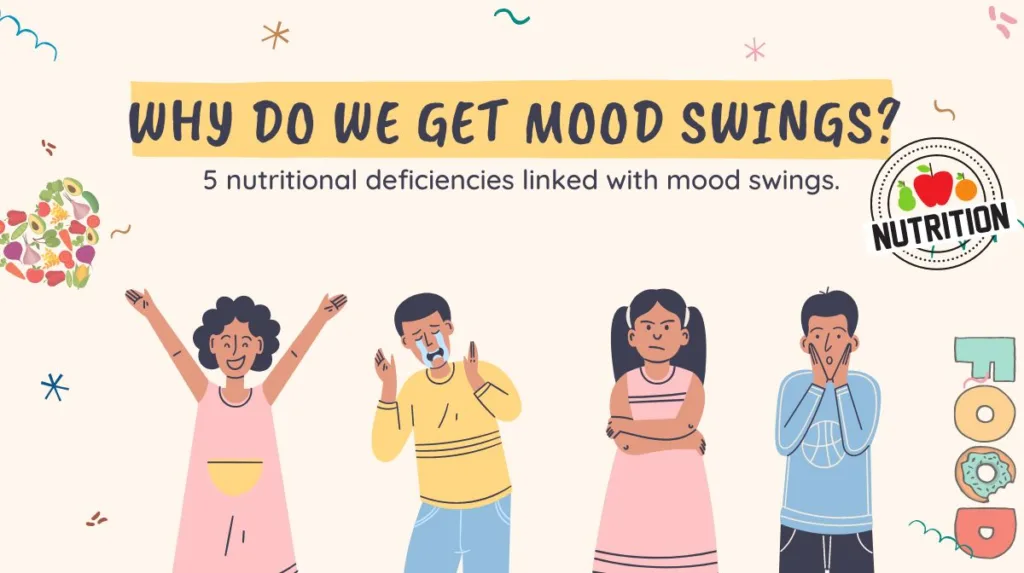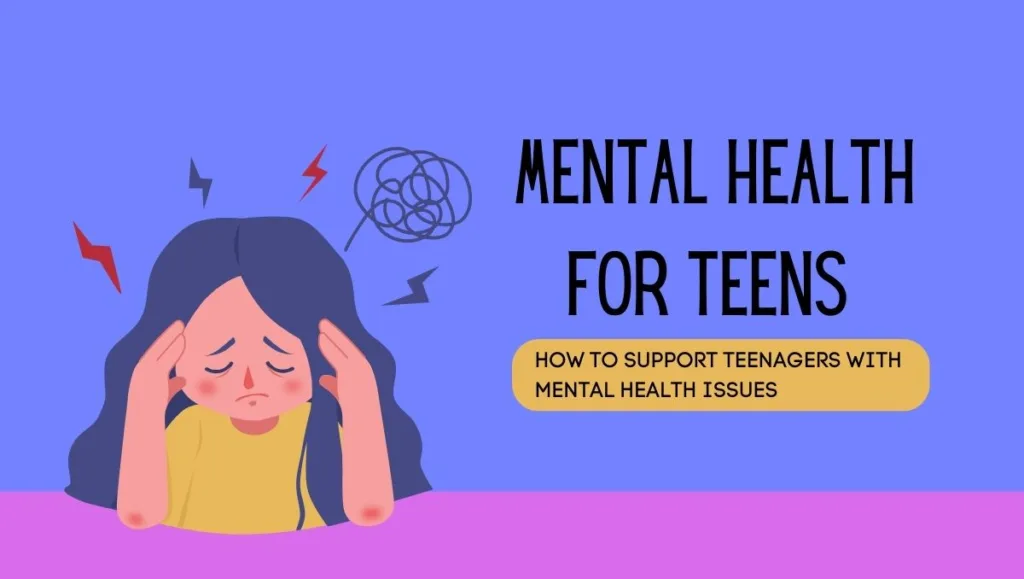Mood swings are sudden and significant changes in mood. The term “mood swing” is often used to characterize abrupt and major shifts in feelings. Mood swings are frequently compared to a “roller coaster” of emotions, ranging from contentment and happiness to irritability, anger, and even sadness. People’s thoughts, feelings, and behaviors are just a few of all aspects of life that are greatly influenced by their moods. Decision-making and motivation may be impacted by these emotional conditions. Relationships and interpersonal interactions may also be impacted.
A strong connection between basic nutrition and emotional well-being is revealed by the complex interactions between mood swings and nutritional deficiencies. The building blocks of neurotransmitters, the chemical messengers in the brain that control mood and emotions, are nutrients. This delicate balance is disturbed by deficiencies in important vitamins, minerals, and fatty acids, which show up as unpredictable mood swings and emotional instability. Understanding this connection highlights the importance of maintaining proper nutritional intake for mental health and balance.
Table of Contents
Understanding Mood Swings

According to UCLA Health, “mood swings” are the fluctuation between various emotions. Everyone experiences them at some point in their lives, and they usually don’t cause any issues. A frequent and normal response to difficult circumstances, such as unpleasant life events like separation or a move, can be mild to moderate mood swings.
Mood swings, however, can sometimes be a sign of a more serious underlying problem, such as a form of depression or another medical or mental health condition. When your mood or overall emotional state is out of sync with your environment and interferes with your ability to function, you may have a mood disorder.
There may be periods of your life that are more stressful than others, which could make you more prone to mood swings. Experiencing a divorce or breakup, losing a job, or mourning the loss of a loved one, for instance, can all result in a range of difficult emotional shifts, including mood swings.
Mood swings might result from hormonal changes that occur to all of us at different times throughout our lives. Mood swings are frequently caused by hormonal changes that youngsters experience as they approach the pre-teen and teen years. Puberty-related mood fluctuations that occur during adolescence are a typical aspect of development and are typically temporary.
The National Heart, Lung, and Blood Institute states that several elements of your health, including your mood, can be impacted by the quantity and quality of sleep you receive. For example, research indicates that stress and anger may be associated with sleep deprivation. Inadequate sleep can also instigate the symptoms of an underlying mood condition, such as depression or bipolar disorder, or cause mood swings.
Mood swings may indicate the presence of another mental health illness, such as borderline personality disorder, or an underlying mood disorder, such as depression or bipolar disorder. Extremely fluctuating mood swings that can last anywhere from a few hours to several days are common in people with borderline personality disorder.
Mood Swings in Women

Throughout the female life cycle, estrogen and progesterone fluctuate often and their importance in female physiology is well-established. Mood swings, however, may result from other hormone imbalances brought on by aging or illness. For instance, low testosterone in females can affect sex drive, weight, and vitality. Anxiety, insomnia, and weight gain are associated with a high level of cortisol. Due to their impact on a woman’s lifestyle or general health and well-being, any of these factors may result in mood swings.
A significant number of women who are of reproductive age suffer from premenstrual syndrome (PMS), which causes mood swings in women in the days leading up to menstruation. Furthermore, severe PMS can be emotionally hampering for some women, even though most women find monthly irritability, frustration, and mood swings to be typical menstrual symptoms. The most common emotional PMS symptoms are irritability, anger, depression, crying, oversensitivity, feeling nervous and anxious, and alternating sadness and rage.
The Diagnostic and Statistical Manual of Mental Disorders, published by the American Psychiatric Association, lists PMDD as one of the mental illnesses that women are more likely to develop if they have a family history of depression or if they have already had postpartum depression.

For a woman to be diagnosed with PMDD, she must experience at least five of the following symptoms around the time of her period – intense sadness or despair, possibly accompanied by suicidal thoughts, constant irritation and anger, mood swings, crying, lack of interest in relationships and daily activities, difficulty in concentrating or thinking clearly, exhaustion and low energy and food cravings or binge eating. These symptoms are seen to go away soon after the onset of menstruation.
There are several points you can follow in order to stabilize mood swings during periods and ovulation and even in general –
Workout – Make an effort to exercise for at least half an hour most days of the week. An everyday stroll about your neighborhood can be beneficial in reducing emotions of depression, anger, and nervousness.
Nutrients – Try not to give in to your cravings for junk food that may accompany PMS. Excessive intake of fat, sugar, and salt can all have a devastating effect on your mood. While you don’t have to fully eliminate them, try to replace them with healthy grains, fruits, and veggies. This can prevent blood sugar falls which can make you anxious and help you feel full throughout the day.
Sleep – If your menstruation is still a few weeks away, deprivation of sleep can seriously affect your mood. In the week or two before your period, in particular, make an effort to obtain seven to eight hours of sleep every night. Examine the effects of sleep deprivation on your body and mind.
Stress – Unmanaged stress makes mood swings worse. When you start to feel the symptoms of PMS coming on, especially, use yoga, meditation, or deep breathing exercises to help you de-stress.
Mood Swings in Men

Hormone imbalance in males is actually rather frequent as they age. A male hormone imbalance can cause a variety of symptoms, from mild to severe, that can seriously affect day-to-day activities and possibly put one’s health at risk. Finding the right treatments and getting back to living a happy, active life for men requires an understanding of the main signs of hormone imbalance. Your body’s endocrine system is largely responsible for controlling hormone levels.
To control many bodily processes and preserve general balance, hormones function as messengers, going to different organs and transferring information between different cells and organs in the body.
Stress is another factor that adds to the increasing mood swings in men besides hormonal imbalance. Academic pressure, career issues, societal responsibilities, and other factors add to the stress, stressing the mood swings in men. Because of elevated estrogen levels but decreased testosterone, many men experience a psychological issue where their sex drive declines, which can disrupt their intimate relationships.
Several reasons, the most common of which are depression, stress, heart disease, inflammation, chronic illness, and sleeplessness, can cause erectile dysfunction. Gynecomastia or the enlargement of the breasts in males, is one of the most prominent signs of a hormonal imbalance in men. Cortisol levels can cause fat growth and muscle loss which may neutralize the benefits of dieting and hard work in the gym.
Hormone imbalances can have a significant impact on your mood and mental health in addition to your physical health. Hormonal flaws in men can lead to mood swings, decreased motivation, anxiety, melancholy, and/or increased irritability. Many men fail to seek the necessary assistance to regain their mental well-being and peace of mind because they are unaware that these changes are caused by a curable hormone imbalance.
Males who suffer from severe mood swings may avoid talking about their emotions for fear of criticism or being viewed as less manly. But to deal with their challenges, males need to communicate their feelings. To combat this, we can urge males to express their feelings verbally. We have to accept that everyone’s expression of emotions, including crying, is natural and healthy behavior. Gender-role expectations in society shouldn’t be connected to crying. Men need to feel free to express their emotions without fear of shame or condemnation in safe areas that we must create. It’s critical to have open discussions about psychological well-being in families, communities, and interpersonal interactions.
We can rethink what it means to be a man and encourage men to seek support when confronting hardships if we challenge traditional male values and acknowledge mood swings in men. Men can take proactive measures to improve their mental wellness when more people are aware of the early warning signs, symptoms, and available tools. The prioritization of overall health can be achieved through normalizing therapy and counseling, incorporating mental health talks into routine healthcare check-ups and sharing good tales of male role models who have sought treatment.
Unraveling the Link – Nutritional Deficiencies and Mood Swings

Similar to a premium vehicle, your brain performs optimally when it is fed only premium gasoline. Consuming nutritious foods rich in vitamins, minerals, and antioxidants nourishes the brain and guards against oxidative stress, which is caused by free radicals, the “waste” that is created when the body utilizes oxygen and can cause cell damage.
If you consume anything other than premium fuel, your brain may suffer harm, just like an expensive car. The brain is not very good at getting rid of molecules that come from “low-premium” fuel, including those found in processed or refined diets. For instance, diets high in refined sugars are bad for the brain. They weaken your body’s ability to regulate insulin and also encourage oxidative stress and inflammation. A diet heavy in refined sugars has been linked in several studies to decreased brain function and even a worsening of symptoms associated with mood swings including sadness.
These are the top five nutritional deficiencies associated with mood swings –
Magnesium
Our bodies need magnesium for a variety of functions, including sleep. Headaches and insomnia may be symptoms of low magnesium levels. Natural sources of magnesium include seeds, beans, nuts, and dark green vegetables.
Zinc
For normal physiological processes, including neurological processes, zinc is necessary. The area known as the hip of the brain contains the highest quantity of zinc in the body. Furthermore, a decrease in Brain-Derived Neurotrophic Factor (BDNF), which affects our mood, might result from low zinc levels. Foods high in zinc include chicken, beans, some types of mushrooms, curd, and chocolate.
Vitamin D
The only kind of vitamin that functions as a hormone is vitamin D. The body’s tissues with vitamin D receptors include the muscles, heart, brain, and immune system. Consequently, vitamin D is necessary for every biological process. To obtain more vitamin D, the best way is to spend time in the sun.
Vitamin B12
Creating DNA in our cells requires vitamin B12. It is essential for the production of hemoglobin as well as the functioning of the nervous system. B12 levels must be maintained for the brain to be healthy. Dairy and poultry products are excellent sources of vitamin B12.
Omega 3 fatty acids
The brain and mental health depend on omega-3 fatty acids. The synthesis of serotonin and neurotransmitter signaling is supported by these lipids, which are essential for emotional health. Omega-3s can be found in plant-based foods like flax seeds and fatty fish like salmon.
Elevated levels of anxiety, sadness, and depression may be caused by a deficiency in magnesium. Fluctuating mood swings, depression, attention deficit disorder (ADHD), memory loss, and other mental health problems can be brought on by zinc deficiency. A growing number of vitamin D insufficiency raises major metabolic and psychological concerns. Individuals who have low levels of Vitamin B12 run the risk of developing memory loss and other neurological disorders. Low levels can cause sensations of sorrow and irritation and have been connected to mood disorders such as anxiety and depression.
A deeper insight into nutritional deficiencies linked with mood swings

These nutritional deficiencies can have prominent symptoms and consequences –
Magnesium
Mood swings symptoms may be the result of insufficient magnesium. People who don’t get enough magnesium may experience increased anxiety, sadness, and depression. The fact that headaches and insomnia are often associated with magnesium deficiency contributes to mood swings even more. These symptoms could significantly impair daily activities and quality of life which could lead to decreased productivity and worsened overall health.
Increase your intake of foods high in magnesium, such as seeds, nuts, beans, and dark green vegetables, to help combat magnesium deficiency and its effect on mood swings. Additionally, with medical guidance, consider taking magnesium supplements. Magnesium influences sleep regulation and the stress response, therefore prioritizing stress reduction techniques and obtaining adequate sleep.
Zinc
Mood shifts, depressive symptoms, and mood swings can all be brought on by a zinc deficiency. Low zinc levels may be the cause of attention deficit disorder (ADHD), memory loss, and increased anxiety. The hippocampus, a region of the brain crucial for mood regulation, has a high concentration of zinc. Because low zinc levels interfere with neurotransmitter function and impair brain-derived neurotrophic factor (BDNF), they may intensify mood swings and negatively impact mental health in general.
Increase your intake of foods high in zinc, such as chocolate, beans, mushrooms, curd, and chicken, to help treat the zinc deficiency linked to mood swings. Look into taking supplements containing zinc while under physician supervision. Regularly check your blood for zinc levels. A healthy food and supplement plan might help promote emotional stability and lessen mood swings.
Vitamin D
Mood swings brought on by a lack of vitamin D can appear as increased anxiety, sorrow, and depression. Low vitamin D levels increase mood swings by interfering with neurotransmitter activation and hormonal equilibrium. Persistent emotional problems and memory loss might result from long-term inadequacies. Low vitamin D levels are also associated with seasonal affective disorder (SAD), a form of depression brought on by insufficient exposure to sunlight. Emotional stability and mental health are dependent on getting adequate vitamin D.
Sun exposure can help lessen the Vitamin D deficiency linked to mood swings. Exposure to sunlight promotes the body’s natural synthesis of vitamin D. Include more vitamin D-rich items in your diet, such as fatty fish, eggs, and dairy products. Alternatively, consult a medical professional to determine whether vitamin D supplements are necessary for optimal mood and general health.
Vitamin B 12
Mental instability and mood swings may result from a vitamin B12 deficiency. Low levels disrupt neurotransmitter activity which affects mood regulation. Possible symptoms include irritability, hopelessness, and anxiety; severe deficiencies may lead to depression and memory loss. Enough B12 is needed to maintain a healthy nervous system and memory and thinking skills.
To control mood swings brought on by insufficiency, look at increasing your intake of dairy and poultry products as dietary sources of Vitamin B12. Consider taking supplements under physician supervision. To maintain your levels in check, eat B12-rich meals and enhanced foods frequently. Moreover, consult medical professionals for specialized direction and oversight to help reduce mood swings associated with B12 deficiency.
Omega-3 fatty acids
A deficiency in omega-3 fatty acids may be a factor in mood swings and mental instability. Enhanced sadness, irritability, and anxiety could be signs. Omega-3 fatty acid deficiencies decrease serotonin production and neuronal function, increasing mood disorders like depression and anxiety. Memory loss, mental decline, and a lower stress tolerance are possible long-term impacts. To support mental and emotional health, one must make sure one’s intake of omega-3 fatty acids is adequate.
To address omega-3 fatty acid insufficiency and its impact on mood swings, raise your intake of fatty fish, such as salmon, mackerel, and sardines, or incorporate plant-based sources, such as flaxseeds and walnuts, into your diet. Additionally, receive professional guidance and assistance for emotional stability and mental health.
Nutritional deficiencies and mood swings are important elements that influence an individual’s general well-being. Stable moods and clear thinking are nurtured by a well-balanced diet full of vital nutrients that fight deficits. Stress reduction strategies further strengthen emotional adaptability and get enough sleep. Recall that when negotiating challenging emotional environments, getting expert assistance is essential. Make holistic approaches to mental health and self-care routines a priority. Nurture your body and mind simultaneously. Accept the benefits of a healthy diet, stress-relieving hobbies, and networks of professional assistance. Let’s go out on a path to vibrant living and emotional balance together.
Nothing less is worthwhile for your well-being.
Also Read: Best Workout Session Tips: Why Should You Eat Before A Workout?
FAQs: Addressing Common Concerns
1. What are mood swings and why do they occur?
Mood swings are abrupt mood changes characterized by emotional highs and lows. They can occur due to hormonal fluctuations, stress, or underlying health conditions.
2. How do hormonal changes during periods contribute to mood swings?
Hormonal fluctuations can disrupt neurotransmitter levels, leading to mood swings during periods and ovulation. Additionally, changes in estrogen and progesterone levels can affect serotonin and dopamine production, influencing mood.
3. Can nutritional deficiencies cause mood swings?
Yes, nutritional deficiencies, such as vitamin D, B vitamins, omega-3 fatty acids, magnesium, and zinc, can contribute to mood swings by affecting neurotransmitter function and hormone regulation.
4. What are some dietary sources of nutrients that can help stabilize mood?
Foods rich in vitamin D include fatty fish, fortified dairy products, and sunlight exposure. B vitamins can be found in whole grains, leafy greens, and lean meats. Omega-3 fatty acids are abundant in fatty fish, flaxseeds, and walnuts. Magnesium-rich foods include nuts, seeds, legumes, and leafy greens. Zinc sources include oysters, red meat, poultry, beans, and nuts.











2 responses
Loved this, quite an informative and helpful content related to today’s lifestyle.